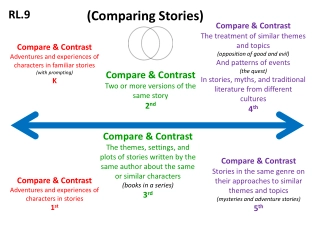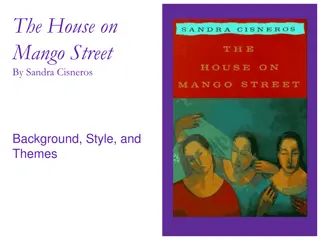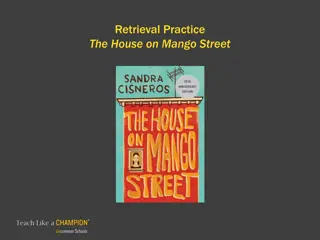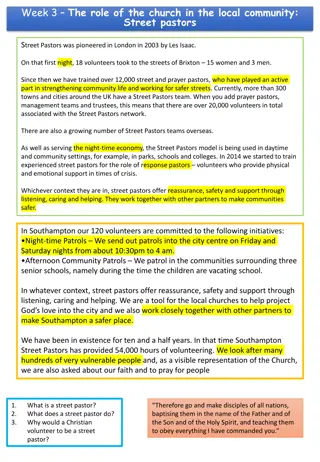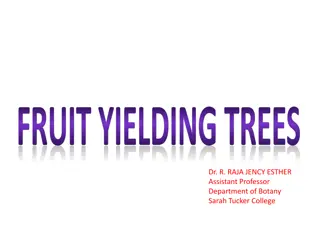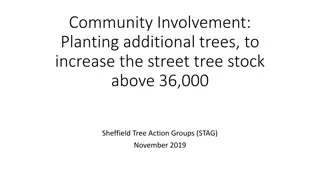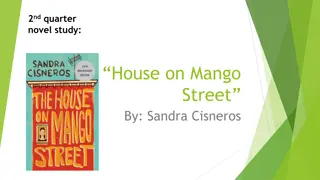Stories of Strength and Struggle on Mango Street
Four unique narratives unfold on Mango Street, each showcasing different forms of strength and resilience amidst hardship. From the connection between a girl and some skinny trees to the complexities of language barriers and trapped lives, Esperanza navigates the challenges around her, drawing inspiration and lessons from those she encounters.
Download Presentation

Please find below an Image/Link to download the presentation.
The content on the website is provided AS IS for your information and personal use only. It may not be sold, licensed, or shared on other websites without obtaining consent from the author.If you encounter any issues during the download, it is possible that the publisher has removed the file from their server.
You are allowed to download the files provided on this website for personal or commercial use, subject to the condition that they are used lawfully. All files are the property of their respective owners.
The content on the website is provided AS IS for your information and personal use only. It may not be sold, licensed, or shared on other websites without obtaining consent from the author.
E N D
Presentation Transcript
Four Skinny Trees She and the trees understand each other. They don t belong on Mango Street, but are stuck. Both have secret strength and continual anger, which pushes them to keep going. Esperanza begins to develop her sense of self and find inner strength by noticing the beauty around her. She can find inspiration even in these skinny, ugly trees, and is able to empathize with them. She is getting stronger and starting to recognize her own strength.
No Speak English Mamacita just arrived in America. She never leaves the apartment and refuses to learn English. Some neighbors think she never leaves because she is too fat to get down the stairs, but Esperanza thinks it is because Mamacita is afraid of English. Esperanza is beginning to understand the power of words, as well as the powerlessness of lacking words, like Mamacita or her father did. Like Esperanza, Mamacita spends much of her time dreaming of a house that she cannot have, but unlike Mamacita, Esperanza wants to work to achieve her dream.
Rafaela Rafaela s husband locks her in their apartment. He is afraid she will escape because she is so beautiful. Rafaela leans out her window and listens to the music from the bar down the street. She is basically watching life go by but not participating in it. Rafaela is another trapped woman, and an example of a path that Esperanza wants to avoid. Rafaela has given into her love of being desirable and sacrificed her freedom in doing so. Esperanza s inner conflict between sexuality and autonomy is growing stronger.
Sally Sally is a beautiful girl at Esperanza s school, and Esperanza wishes she could be friends with Sally. Sally seems to diminish every day as she walks sadly home to her father. He tries to keep her trapped in the house because he is very religious and thinks her beauty means trouble. Sally becomes an important figure for Esperanza, as she represents a kind of sexual maturity that Esperanza finds intriguing. Sally appears to have retained her autonomy while still being desirable to boys, and Esperanza wants to learn her ways. Sally does not seem trapped by her sexuality, but by her abusive father. Esperanza romanticizes Sally, and is beginning to choose Sally s path.
Minerva Writes Poems Minerva is only slightly older than Esperanza, but she is already married and has two children. She is sad all the time, and her biggest problem is her abusive husband, who she kicks out and takes back over and over again. Minerva writes poems and shares them with Esperanza. Minerva is the trapped woman most similar to Esperanza and shows a dangerous possible example of Esperanza s future. Minerva shares Esperanza s poetic instincts, but she has become trapped by a man and her young children. Esperanza realizes Minerva s plight and sees that she must work hard to avoid it.
Bums in the Attic Esperanza wants so badly to have a nice suburban house. On Sundays her family drives by these houses and imagines living in them, but Esperanza feels ashamed of looking desperate on these trips. She imagines that people living so high up have forgotten about the poorer people below. Esperanza resolves to have a nice house someday but to never forget where she came from. She says she will invite bums to stay in her attic, because she knows what it s like to not have a house. Esperanza begins to get more practical in realizing her goals she no longer wants to just dream about a house, but to actually work and get one. She is beginning to realize she must help those who aren t as strong as she is.
Beautiful & Cruel Esperanza thinks she is ugly and that her looks will trap her at home. Her mother tries to comfort her by telling her she will get prettier as she gets older, but Esperanza has decided not to grow up tame like the rest. She wants to be like the women in the movies who are beautiful and cruel. These women make men love them but never give up their power. Esperanza is beginning this quiet war by leaving the dinner table like a man, without pushing in her chair or cleaning up her plate. She is trying to find a solution to her inner conflict (of sexuality versus autonomy).
A Smart Cookie Esperanza s mother regrets her life choices. She warns Esperanza to stay in school and study hard she needs to be able to take care of herself without a man. Her mom explains that she quit school because she was ashamed of her clothes. She seems disgusted with her former self. Esperanza doesn t allow her mom to be a positive role model because she is still stuck on Mango Street, but her mom is a positive force, and gives good advice. Esperanza must not think she is smarter than the other women, and she must remain independent and in school, or else she will end up married young and trapped like the other women of Mango Street.
What Sally Said Sally admits that her father hits her, but says that he never hits her hard. Her father is afraid that she ll run away with a man and shame the family just like his sisters did. Sally asks to stay at Esperanza s but her father comes over crying and apologizing. She goes home, but he ends up beating her again. Sally s father is one of the most oppressive male characters in the book. Sally is trying to escape her abusive home life through sexual experimentation with boys, but Esperanza doesn t realize this yet.
The Monkey Garden A neighboring family with a pet monkey moves away, and the children of Mango Street take over the abandoned monkey garden. It is full of beautiful plants and animals, but it soon becomes a dumping ground for old cars and trash. Esperanza, Sally, and some other kids are playing in the monkey garden. The boys steal Sally s keys, and say she has to kiss all of them if she wants them back. Sally agrees and they all go behind an old car. Esperanza is upset. She runs to tell Tito s mom, but she does nothing. Esperanza tries to defend Sally herself, but everyone laughs at her. She runs away, ashamed, and hides under a tree in the garden. She wishes she could melt away. She observes that her own feet and shoes look foreign to her, and the monkey garden seems foreign as well.
The Monkey Garden The monkey garden is a symbol of the Garden of Eden in the Bible a perfect place of innocence where something happens causing a loss of innocence. The loss of innocence moment begins when Tito and the other boys play an adult game. They see no problem in manipulating Sally for sexual favors, and she allows herself to be manipulated, not understanding that there could be better interactions with boys. Esperanza is upset at how the women of Mango Street turn a blind eye to male oppression. The boys and men are able to act as they do because the women don t help each other, and when Esperanza does try to help, Sally shames her. Esperanza feels confused and afraid and no longer knows where she belongs, as a child or a woman.
Red Clowns Esperanza addresses this section to Sally. Esperanza has just been sexually assaulted at a carnival. Esperanza was waiting for Sally by the red clowns, but Sally disappeared with an older boy. While she is waiting, a group of boys attacks Esperanza. She never describes exactly what happens, but it s implied that she was raped. Esperanza does not blame her attackers for her rape, but instead is angry at Sally and the other women in her life for not warning or protecting her. The experience shakes Esperanza to her core and makes her feel like a helpless child, despite her growing maturity.
Linoleum Roses Sally gets married before the eighth grade, to an older man who has to take her to another state where their marriage is legal. She says she is in love, but Esperanza thinks she just got married to escape. Sally claims to be happy, but her husband won t let Sally go out on her own, or talk on the phone, or have her friends visit, or even look out the window. Sally does manage to escape her father, but she finds a man who is just as oppressive. Looking out the window is the last hope and pleasure of many of the trapped women of Mango Street, but Sally s husband denies her even that. Sally has a nice house like Esperanza dreams of, but it is not a house of her own it is more like a cage.
The Three Sisters Rachel and Lucy s baby sister gets sick and dies. The neighbors go in and out of Rachel and Lucy s house to view the body. Three old aunts arrive to visit the family, and Esperanza thinks they are intriguing and magical. The three sisters call her over and tell her Esperanza is a good name, and that she is special and will go far. They ask Esperanza to make a wish, and then they say it will come true. One of the sisters pulls Esperanza aside and says that after Esperanza leaves the neighborhood, she must come back for those who cannot. She tells her that Esperanza will always be Mango Street. Esperanza is amazed that the sisters guessed her wish, but she also feels ashamed for wishing something so selfish. The three sisters want her to accept her name which she used be ashamed of and find strength within herself.
Alicia & I Esperanza complains to Alicia that she doesn t have a house. Alicia points to the house on Mango Street, but Esperanza refuses to call it home. She repeats that she has no house except for one in her dreams. Alicia says like it or not you are Mango Street, but Esperanza vows to never return until somebody makes Mango Street better. It is notable that Esperanza is spending time with Alicia now (who is studying and trying to leave) instead of Sally. Alicia also reiterates the words of the three sisters Esperanza must remember who she is, come to terms with Mango Street, and return for the ones who need help.
A House of My Own Esperanza describes the house of her dreams it will not belong to a man, but only to Esperanza herself. It will have flowers, a porch, her books and stories inside, and her shoes by the bed. The house will be silent and safe, clean as paper before the poem. Esperanza brings together what she has learned and expands upon her dream. The house is her own now, with her own autonomous sexuality (her shoes) next to her own bed and her materials for reading and writing. Her house, like blank paper before the poem, will be something she will create.
Mango Says Goodbye Sometimes Esperanza explains that she likes to tell stories to herself. She says she is going to tell about a girl who didn t want to belong, and then she repeats the parts of the first chapter about the other streets she has lived on. The house she remembers most is the house on Mango Street. She says that when she writes about the house, the writing sets her free a little bit. Esperanza has found that writing sets her free and helps build her identity writing is the home in the heart that Elenita predicted. Esperanza also resolves to do what the three sisters and Alicia suggested that is, leave Mango Street to become strong, and then return for the sad, trapped ones who cannot improve their lives on their own. Her strength is not just in escaping Mango Street, but in helping others who are still stuck.







